*trigger warning: mentions of suicidal ideation along with poor MSP well-being*
Regular blog readers will know that I talk openly about the importance of mental health and MSP wellbeing. I share about my own struggles with depression, and I encourage others to do the same, so they can get the help and support they need.
My friend Diana Giles, who runs an IT company in Oklahoma, is also the host of a podcast, “For the Health of IT’, where she and her guests discuss the unique challenges faced by managed service providers and those in the tech space. I was delighted to be a guest recently, and this article is a summary of our discussion.
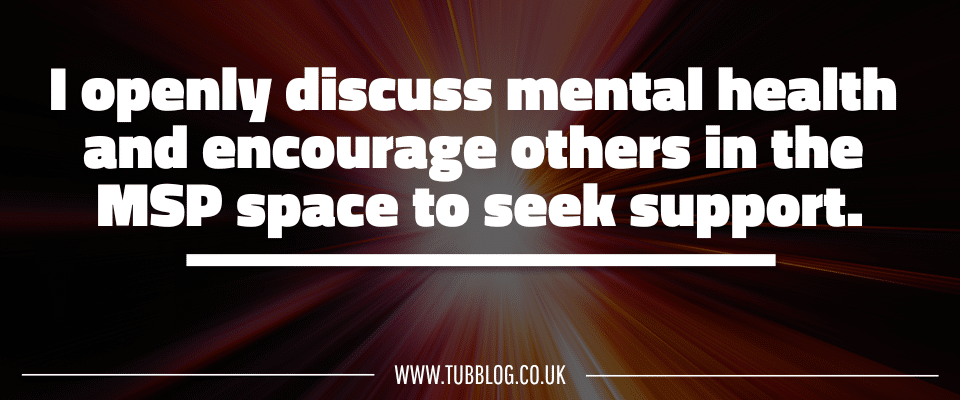
Listen to the Original Interview
The Back Story
I was diagnosed with clinical depression in my early 20s, which is a chemical imbalance in the brain. But after much reflection, I see that those darker thoughts were present in my childhood, too.
At that time, depression, anxiety and mental health weren’t really discussed. And that was the case when I started in my career. Fortunately, things have moved on a lot, and we’re starting to share about how we feel more. That’s so important, because if you’re struggling, know that you’re not alone.
After my initial diagnosis I was prescribed antidepressants, and the way my GP (general practitioner – doctor) described it was that this would rebalance my brain chemistry. So it seemed manageable.
However, in the intervening 20 years, I’ve learned that it’s more nuanced and complex. There’s the physiological side of things, but just like a computer, the brain can be impacted by what goes in. I’ve dug underneath to better understand myself.
My Wellbeing Journey
I started my IT career in a corporate setting, and it quickly became apparent that it wasn’t for me. I struggled with the rigid timekeeping and lack of reward for a job well done.
And at the same time, I was still adjusting to my diagnosis, and there were days when I just couldn’t get out of bed. But a lack of awareness of mental health at that time meant that my managers were not always supportive.
I knew that I could deliver the results, so I set up my own MSP (managed service provider) business, where I could be in charge of my own hours. It allowed me to manage my energy levels and still give excellent service to my customers.
Another lesson I learned early on was that I’m a tech geek and I started my own business to help people. But if you don’t look after yourself first, you won’t be able to help anybody else. And I think that’s where MSP wellbeing can fall down.
That realisation changed the course of my life. If I wanted to better serve my clients, then I needed to prioritise self-care and self-development. And that’s true of all small business owners. You can’t continue to put your customers before yourself.
As Diana says, we’re often guilty of putting pressure on ourselves under the mistaken belief that our clients expect it of us. Here at TeamTubb, I encourage everyone to clarify with me on deadlines – what does ‘urgent’ actually mean?
Because to some people, urgent means ‘drop everything and deal with this now’ and to others it means ‘I’d like this doing in the very near future.’ It’s another powerful lesson we all need to learn.
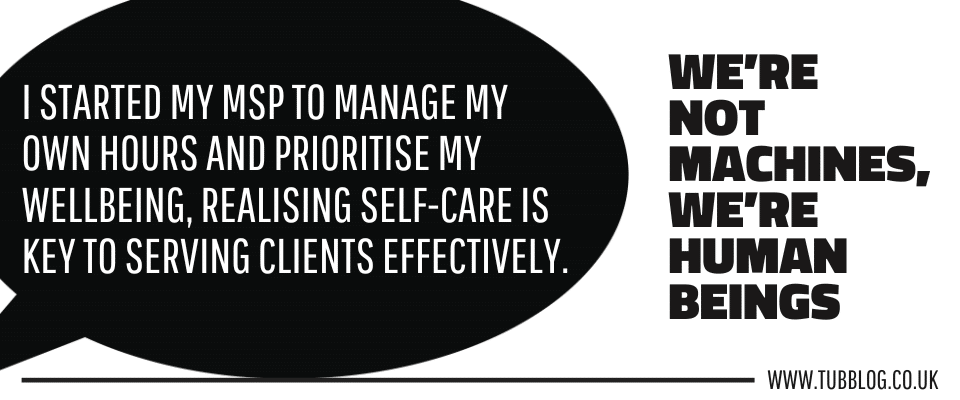
Managing Your Wellbeing as an MSP Owner
When you first set up your MSP, you feel relieved that you’re no longer answerable to anyone else. But of course that’s not really the case. You have obligations to yourself, and also to your clients.
It’s easy, when you first start out, to accept work from anyone who offers. However, the type of clients you work with can mean the difference between having a good time in business, and a bad time. I began assessing who would be a pleasure to work with and who wouldn’t, and disqualified the latter.
Even to this day, I still put myself under pressure and give myself a hard time, although I’ve got better at it. You wouldn’t take it from a client or anyone else, so practice self-compassion and be kinder to yourself.
Diana says being in business is hard enough without adding depression into the mix, and that’s true. But just like I don’t say, “I’ve got asthma so I can’t do this”, I don’t use clinical depression as a label, a reason not to do things.
What it does mean is that I have to be more mindful of my own red flags and manage myself and my workload. For instance, I attend a lot of industry events, many overseas. Being on the road means I don’t eat or sleep as well as I do at home, and I don’t get enough exercise and fresh air. And that’s when the black cloud can descend.
Now I recognise my red flags, I don’t just paste on a smile and try to push through. Instead, I rearrange my schedule to give myself some space, quiet and grace. That’s taken a while, but it’s so important to learn that.
Unhealthy Coping Mechanisms for Depression
Diana has seen that often when people are struggling with depression and mental health challenges, they adopt unhealthy coping mechanisms. That’s different for everybody, but it can involve drinking, taking drugs or other dangerous behaviours.
Certainly for me, I reached for the bottle more times than I care to remember. I went out partying and got into scrapes. And today I can’t believe I did that. But it is what it is, and it is self-medicating. I’m fortunate that it didn’t develop into a bigger problem.
I can see now that it was a way to hide from y feelings. I was distracting myself, and I understand why others do it too. But if you had a pain in your arm, you wouldn’t ignore it. So when you have a mental pain, see that as your body telling you that something isn’t right.
I’ve now lived with my clinical depression diagnosis for 28 years, and I still don’t accept some of the reasons why it happens to me. And I often say yes to things that aren’t good for me – such as taking on too many speaking gigs in a short space of time.
But each time, I get a bit better at saying no, too. I learn a little more about myself and practice more self-care. Maybe on day I’ll finally get everything into balance and understand what it’s all about.
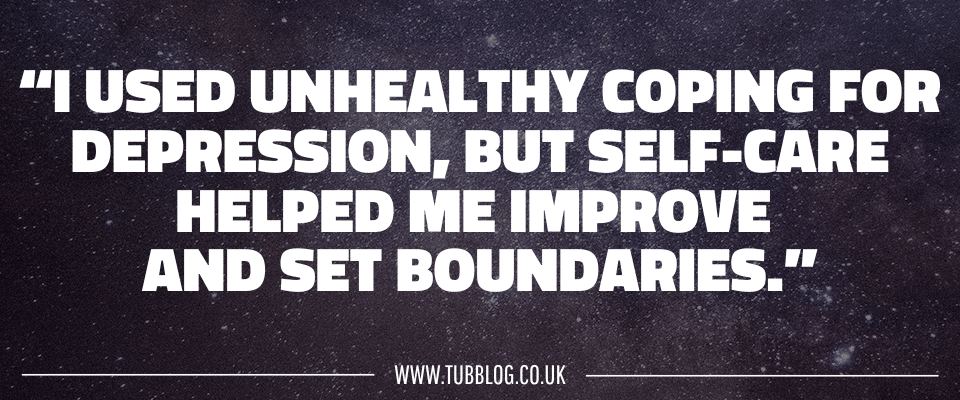
When Poor MSP Wellbeing Moves to Suicidal Ideation
Diana shared that a colleague of hers died by suicide at work one day. And sadly, when she set up her own business her first client came to her because their IT provider took their own life.
We know that many industries can create stressful, volatile work environments, but we can only speak to our own experience in the IT sector. The pressure of running a business can build up, and it certainly happened to me.
At one stage, I didn’t think I would reach the age of 40. I believed that the ‘black dog’ (the term Winston Churchill and many others use for depression) would get too strong and I wouldn’t be able to fight it. Even recently I’ve had suicidal ideation.
Rationally, I know that if I can just hold on it will pass. And it does, although sometimes it takes days rather than hours for that to happen. I know that I’ll wake up one morning and feel better. I’m able to compartmentalise it.
But for the people around me who love me the most, it really rocks them. They see me suffer and know I’m in a really dark place. It’s challenging for them, and it’s sometimes jarring when I seem to bounce back so quickly.
Last year, I spoke on stage at a CompTIA event and shared my story. I told the audience that on occasion when they’ve seen me speak it’s taken a real effort to drag myself out of bed and to push away the dark thoughts in order to present.
Afterwards, people were in tears, not knowing how much I’d been suffering. But more significantly, many of them opened up that they too struggled with their mental health and wellbeing. It was scary, but I’m so glad I did it.
Small Steps to Support an MSP to Better Wellbeing
“What can we do to help people when they feel like that?” asks Diana. For my part, I have a messaging group of people who know they can ask one another for help. When I first shared my mental health challenges with a friend, he said: “Whenever you’re really struggling, send me a message. I’ll drop everything to talk.”
So now I offer the same to anyone who tells me they’re having problems. You need someone to be a witness to what you’re going through. Someone who can help you get through to the other side.
The author Chris Brogan says, “depression is a liar.” When I’m having a hard time, my wife will say, “This is your unkind brain speaking to you. It’s the nasty version of you saying mean things.” So reaching out to someone who knows you well can reassure you that it’s not true and it’s just your unkind brain.
And if you don’t feel that you have anyone you can talk to, I assure you that you do. But if you’re not ready to open up to them, I urge you to talk to someone. I recommend Mind and The Samaritans for mental health support.
You also need to know what your red flags are, so that you can spot them and address them before things get too much for you. For myself, I created a resilience plan to assess how I feel. That’s things like, am I feeling rundown or being critical of others?
I share this with my loved ones and ask them to keep an eye out for any of these warning signs. They know to point out changes in my behaviour so I’m aware that I might be approaching burnout and a downward spell.
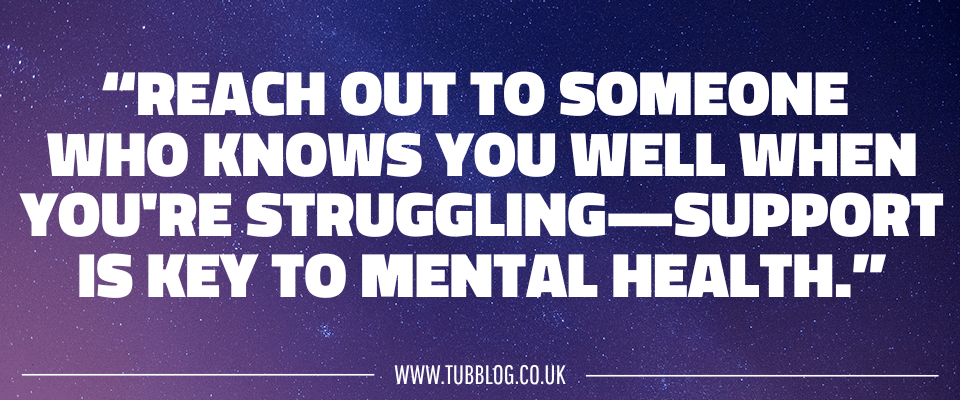
Journalling for Better MSP Wellbeing
I’ve been journalling daily for the last 10 years, and I highly recommend it. Don’t dismiss it as ‘a teenage girl activity of keeping a diary’! There’s more to it than that. I write down three things I’m grateful for every day. Gratitude is a great way to combat the unkind brain. If the black dog comes along, I can tell it it’s a liar.
I also like to set goals for myself, and plan three things I want to achieve each day. And then by evening, I list three awesome things that happened. And what’s really interesting about journalling is that it helps you to spot the positive events even when things seem to have gone badly.
We’ve all been there – you get a phone call from an irate customer at the end of the afternoon and you feel like your whole day has been terrible. But the act of writing down gratitudes and nice experiences helps to reframe the day in your mind.
Diana shared her own journalling practice is sightly different, but she’s been doing it for the last four years. “Each morning, I write down one personal thing and one professional thing that I’m grateful for. It works for me that way.”
That’s the beauty of journalling – it can be done in whatever way works for you. Jot down three bullet points, or write paragraphs and let it all flow out of your head and onto the page.
Final Thoughts
Whatever role you have in the IT industry, don’t try to do this journey alone. There are all kinds of places where you can find support. As well as CompTIA, there are local peer groups, in person and online events and communities you can be part of.
Places like The Tech Tribe are warm and welcoming, and illustrious leader Nigel Moore has been open about his own mental health. Plus you’re in a safe space with peers who understand the specific challenges of the industry. It’s a lot healthier than sharing on Facebook.
Diana agrees: “There’s something about peer support – people who really get what you do – that really is therapeutic. Even more so than your spouse or others you’re close to – because they’ve had similar issues.”
The number one thing I want you to take away from this is: ‘You are not alone. Reach out and ask for help. There are others who’ve been through this too.”
You might also want to try meditation. It can seem ‘woo-woo’, but many high achievers in the IT industry have adopted the practice. What meditation does is teach you to sit with your own thoughts. To be less judgemental and more mindful.
When you self-medicate, that’s because you’re uncomfortable with dealing with your thoughts. Meditation allows those thoughts to come to the surface and for you to be curious about them.
I’d love to hear your feedback on this one, so please comment below. Have you got any resources you’d like to share? Feel free to pass them on.
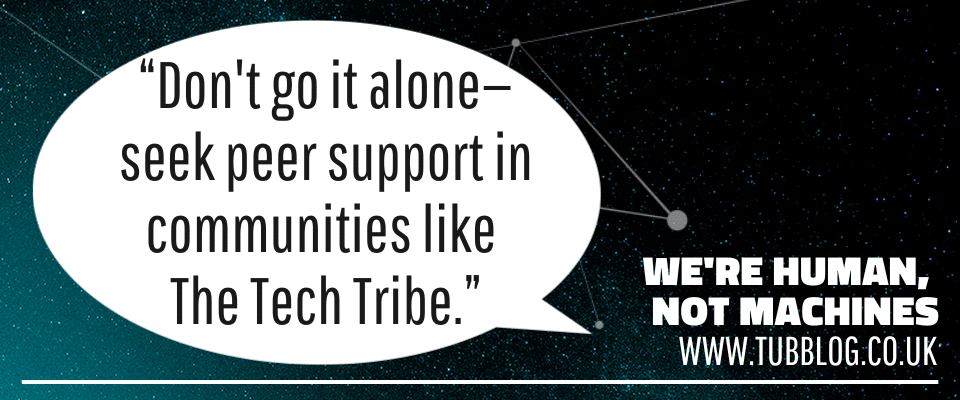
Mentioned in This Episode
- My book: The IT Business Owner’s Survival Guide
- Mental Health Resources for MSP Business Owners
- Mental health charity: MIND
- Suicide support charity: The Samaritans
- IT community group: The Tech Tribe















Comments